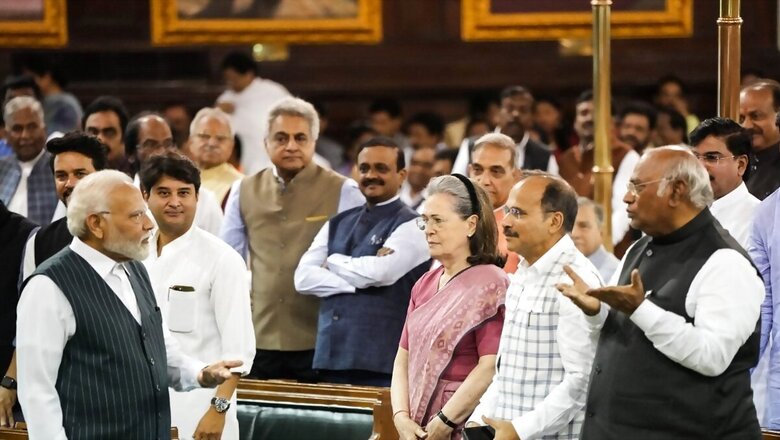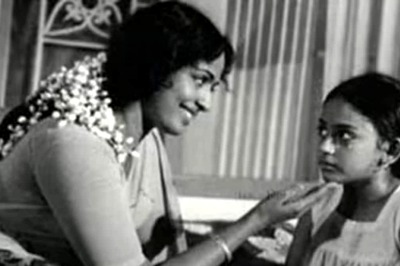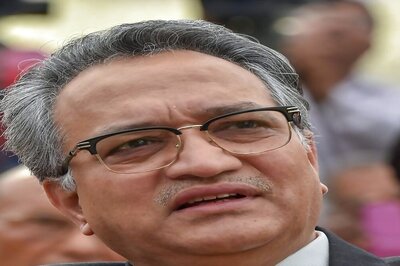
views
Implementing the Women’s Reservation Bill, 2023, or the ‘Nari Shakti Vandan Adhiniyam’, without a fresh census and delimitation exercise could expose the legislation to a legal challenge as there needs to be criteria for reserving a particular seat for women, top government sources have told News18.
Questions are being raised on why the Bill is not being implemented immediately from the 2024 Lok Sabha elections and why the Narendra Modi government chose to bring in a new Bill rather than pursue the Bill passed by the Rajya Sabha in 2010.
Sonia Gandhi in Parliament on Wednesday said the Bill should be implemented immediately and the OBC reservation should also be given in the women quota.
Home Minister Amit Shah, however, explained that the government could be accused of partisanship if a seat like Wayanad or Hyderabad was reserved for women without any criteria determined through a delimitation exercise. He said opposing the Bill would not mean that the Bill would come sooner.
Government sources hence say the Women’s Reservation Bill has to wait for a fresh census and delimitation exercise. “There has to be criteria to reserve any seat for a woman candidate. If we do this, without a fresh census and latest data, it will be up for legal challenge. The last census data is of 2011 and the last delimitation was done even before that. The 2021 census was delayed due to the Covid-19 pandemic," a government source explained.
A Supreme Court Case
In the case of Rajesh Kumar Daria v. Rajasthan Public Service Commission and Ors, a three judge bench of the SC explained the difference between horizontal and vertical reservation. It was stated that special reservations in favour of those who are physically handicapped, women, etc., under Art. 16(1) or 15(3) are horizontal reservations whereas a vertical reservation is made in favour of a backward class under Art. 16(4).
Sources said upon a reading of the same judgment, it is apparent that the issue of reservation in Parliament is one which is horizontal (for women) as well as vertical (SC/ST). “In this regard, it would be prudent to first carry out the delimitation and then implement the reservation," sources said.
Delimitation refers to the process of demarcation of the boundaries of parliamentary or assembly constituencies. The process is carried out every few years to ensure that each constituency has approximately an equal number of voters — the underlying logic being that a set number of voters have one representative in the Lok Sabha as well as in the state assemblies across the country.
“It would be incorrect to term women’s reservation as merely a horizontal type of reservation. This is because reservation for SC/ST exists in the Lok Sabha. This will create an overlap as the women’s reservation will also touch upon the reservation granted to SC/ST," the source said.
The government feels that if it implements reservation post the delimitation, it will ensure that this issue of ‘overlap’ is suitably dealt with without creating any legal tussles which may derail the process of women reservation altogether. “Moreover, it will ensure that women get greater number of seats and are adequately represented in lacking constituencies as per the census," sources said.
The government feels that implementation of horizontal reservations alongside vertical reservations presents a myriad of challenges. “These challenges can lead to operational difficulties, legal battles, and even potential injustices. It’s essential to reconsider such strategies to ensure fair representation without compromising the integrity of the electoral process. Thus, it is necessary that the delimitation be carried out to ensure that reservation for women is without any legal obstacles," sources said.
The BJP also feels that from a political perspective, the strategy of the Congress party appears to be to first pressurise the government to implement the issue of women reservation without careful consideration of the vertical reservation in the Lok Sabha and then set up dummy petitioners in the court to challenge women’s reservation on the grounds that it was done without considering the overlap of the reservation offered to SC/ST in the Lok Sabha.
“It is apparent that this is an elaborate scheme hatched to ensure that the Modi government is not credited for introducing and implementing reservations for women in the Lok Sabha," the government sources said.
The timelines
Sources say once the census is conducted after the 2024 Lok Sabha elections, the delimitation exercise can also be done after 2026 till when there is a freeze on the fresh delimitation exercise. Once the latest data is available, women’s reservation will be implemented as per the criteria fixed by the Election Commission of India.
“Same holds good for any OBC quota within women reserved seats, if that is opted for in the future," the source said. There is no OBC reservation in the Lok Sabha for any candidate, while 131 seats are reserved for SCs and STs.
A government source said there is a silver lining too as it is expected that the seats in the Lok Sabha could go up significantly after the next delimitation as the number of seats in the Lower House has been stuck at 543 since 1976 while the population of the country has increased almost 2.5 times since.
This is also the reason why the new Parliament building has a very large Lok Sabha chamber to allow the seating of far more number of MPs than the current strength of 543. “That could mean that more than 180 seats could be reserved for women MPs in the Lok Sabha after the delimitation as the total number of seats would go up. So, women would get an even better deal," a source told News18.
The government is citing Article 82 of the Constitution in the regard of census and delimitation needed before a fresh reservation being introduced in the house.
Why a New Bill?
A new Bill had to be brought in as there are some significant changes in the Modi government’s Bill compared to the UPA’s in 2010 that was passed by the Rajya Sabha, sources said.
“The major change is while the 2010 Bill mandated a rotation of seats reserved for women, the provision has been dropped in the present Bill. In the earlier Bill, it meant the woman-reserved seat would change in every general election putting a lot of uncertainty in the minds of sitting MPs. That provision has been changed in the present Bill," the source explained.
Congress leader in Lok Sabha Adhir Ranjan Chowdhury had questioned on Tuesday why the government had not followed up on the Bill brought by the UPA in 2010 in Rajya Sabha, claiming that the Bill had not lapsed.



















Comments
0 comment